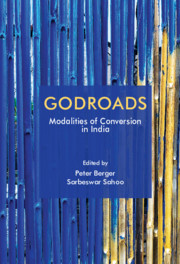Book contents
- Frontmatter
- Contents
- Foreword
- Acknowledgements
- Introduction
- 1 The Rise, Growth and Significance of Shudra Conversion Movements in the Methodist Mission, Hyderabad, 1925–1947
- 2 Communism and the Cross: A Caste–Class Trajectory of Religious Conversion in South India
- 3 Religious Conversion as Ethical Transformation: A Study of Islamic Reformism in Rural West Bengal
- 4 Conversion versus Unity: The Basel Mission among the Badaga on the Nilgiri Plateau, 1845–1915
- 5 Identity Change and the Construction of Difference: Colonial and Postcolonial Conversions among the Sumi Naga of Nagaland, Northeast India
- 6 Conversion to Christianity and Healing: The Naga of Northeast India
- 7 Reshaping the American Evangelical Conversion Narrative in Nineteenth-Century North India
- 8 Cultural Transformations through Performance Arts in Early Twentieth-Century South India
- 9 Reservation and Religious Freedom: Understanding Conversion and Hindu–Christian Conflict in Odisha and Rajasthan
- 10 Rupture and Resilience: Dynamics between a Hindu Reform Movement and an Indigenous Religion in Highland Odisha
- Afterword: India Seen from Amazonia
- About the Contributors
- Index
3 - Religious Conversion as Ethical Transformation: A Study of Islamic Reformism in Rural West Bengal
Published online by Cambridge University Press: 24 April 2020
- Frontmatter
- Contents
- Foreword
- Acknowledgements
- Introduction
- 1 The Rise, Growth and Significance of Shudra Conversion Movements in the Methodist Mission, Hyderabad, 1925–1947
- 2 Communism and the Cross: A Caste–Class Trajectory of Religious Conversion in South India
- 3 Religious Conversion as Ethical Transformation: A Study of Islamic Reformism in Rural West Bengal
- 4 Conversion versus Unity: The Basel Mission among the Badaga on the Nilgiri Plateau, 1845–1915
- 5 Identity Change and the Construction of Difference: Colonial and Postcolonial Conversions among the Sumi Naga of Nagaland, Northeast India
- 6 Conversion to Christianity and Healing: The Naga of Northeast India
- 7 Reshaping the American Evangelical Conversion Narrative in Nineteenth-Century North India
- 8 Cultural Transformations through Performance Arts in Early Twentieth-Century South India
- 9 Reservation and Religious Freedom: Understanding Conversion and Hindu–Christian Conflict in Odisha and Rajasthan
- 10 Rupture and Resilience: Dynamics between a Hindu Reform Movement and an Indigenous Religion in Highland Odisha
- Afterword: India Seen from Amazonia
- About the Contributors
- Index
Summary
Masiruddin Khadim was a relatively wealthy businessman in his early thirties who lived in Joygram, a village in West Bengal. He was a vocal proponent of the Deobandi reformist Islam and an occasional participant of the Tablighi Jamaat (TJ). One day I asked Masiruddin to tell me why he converted to reformist Islam and joined TJ. Masiruddin narrated that he was an ordinary boy, Muslim by name but did not give Islam much thought. He had been living the ‘lifestyle’, and although he was a tad embarrassed about his previously un-Islamic lifestyle, he showed me pictures to testify with a big smile on his face. Like many rural boys aspiring for urban masculinity, he had his pictures taken in a studio, wearing a transparent shirt, tight jeans, large sunglasses, and a clean-shaven chin.
At some point in his twenties, Masiruddin started on a quest for ethical guidance: despite how exciting his life was, he felt a moral void. Inspired by his Hindu friends he started to read the Hindu scriptures, and afterwards the Christian Bible. But he came to the realisation that the Quran, directly given by Allah, provided the most complete system for life, both scientific and ethical, and that he had to follow the ‘right path’ and immerse himself in Islam. Masiruddin spent four months at the global headquarters of TJ in Delhi and changed his lifestyle: he started wearing a white kurta and an untrimmed beard under a shaven upper lip, prayed five times a day, fasted during Ramadan and attended all important local Islamic congregations.
Masiruddin firmly believed that a better society begins with becoming a better person individually. For this reason, he spoke very highly of the Islamic Mission Schools. The most important and distinguishing aspect of these private boarding schools – the first of which emerged in Howrah in 1986 – is not its curriculum but its strict regimen and discipline, and the seamless inculcation of an Islamic disposition within the larger project of the making of the modern Muslim middle class. For Masiruddin, it is important that the mission education would not only benefit the Muslims, but the entire country.
- Type
- Chapter
- Information
- GodroadsModalities of Conversion in India, pp. 85 - 108Publisher: Cambridge University PressPrint publication year: 2020



